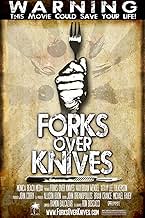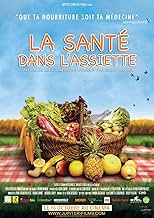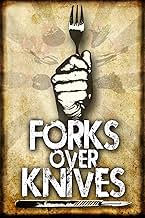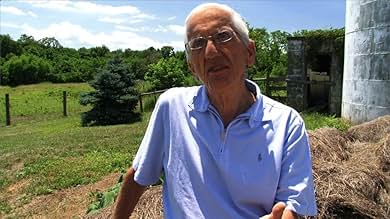Examines the profound claim that most, if not all, of the degenerative diseases that afflict us can be controlled, or even reversed, by rejecting our present menu of animal-based and process... Read allExamines the profound claim that most, if not all, of the degenerative diseases that afflict us can be controlled, or even reversed, by rejecting our present menu of animal-based and processed foods.Examines the profound claim that most, if not all, of the degenerative diseases that afflict us can be controlled, or even reversed, by rejecting our present menu of animal-based and processed foods.
Matthew Lederman
- Self - Doctor
- (as Matthew Ledderman M.D.)
Alona Pulde
- Self - Doctor
- (as Alona Pulde M.D.)
T. Colin Campbell
- Self - Doctor
- (as T. Colin Campbell Ph.D.)
Caldwell Esselstyn Jr.
- Self - Doctor
- (as Caldwell Esselstyn Jr. M.D.)
John McDougall
- Self - Doctor
- (as John McDougall M.D.)
Connie Diekman
- Self - Director of University Nutrition, Washington University
- (as Connie Diekman MEd RD FADA)
Pam Popper
- Self - Executive Director, The Wellness Forum
- (as Pam Popper N.D.)
Doug Lisle
- Self - Doctor
- (as Doug Lisle Ph.D.)
Terry Mason
- Self - Chicago Commissioner of Health
- (as Terry Mason M.D.)
Junshi Chen
- Self - Doctor & Scientist
- (as Junshi Chen Ph.D.)
- Director
- Writer
- All cast & crew
- Production, box office & more at IMDbPro
7.712.9K
1
2
3
4
5
6
7
8
9
10
Featured reviews
It changed my diet
There is no quibbling about it; this movie does have a certain agenda that some people will find objectionable. Okay. But, there is enough supportive information to at least consider altering our heavy meat and dairy eating habits.
As a middle aged male with questionable eating habits, I have been concerned about my blood pressure, cholesterol, general overweight condition, and the numerous medicines that were necessary to keep them in check. When I watched this documentary, I went to check out some of the information presented. While there are some distortions, the bulk of the facts did vet out. Shortly after scrutinizing the documentary's information, I made the decision to try a plant-based diet, excluding all the meat and dairy that I never thought twice about eating for three months. The end of the three month "test" was to include a medical exam and corresponding blood work. Why not? What is there to lose?
I did decide to include a couple of servings of fish a week in my "vegan" diet. This was a tip of the hat to the Norwegian study that saw a dramatic drop in cardiovascular related deaths when meat and dairy were restricted sharply during WWII. What they specifically left out of the film was the fact that the Norwegians stepped up their fish eating greatly during that time. Other than the inclusion of fish, I went with a plant based diet.
In a nutshell, the blood work and physical changes after three months did see significantly better results. My weight was down. The cholesterol was down 25%. My HDL and LDL ratio improved. Blood pressure still remains an issue and, sorry to say, it didn't help with male performance, but the other results were impressive. When I told my doctor to look at the last year results against this year's, he took a double-take and asked, "What's going on?" He okay'd a cutting of my cholesterol and one of my blood pressure meds. A checkup on the changes are due soon.
While there is plenty to criticize about the film's bias, there is room for all of us to take stock and ask, why not take a step toward improving our eating habits? Is there anyone that really believes eating animal based foods is good for you in large quantities? Yes, probably a hamburger now and then isn't going to kill you, but eating a larger portion of fruits and vegetables is a better step for us in the long run. I'm at about the six-month mark now. I can't see going back to a diet similar to what I had before. I like the way I feel now and I like the numbers on my blood report. It is enough to keep me on a vegan diet.
As a middle aged male with questionable eating habits, I have been concerned about my blood pressure, cholesterol, general overweight condition, and the numerous medicines that were necessary to keep them in check. When I watched this documentary, I went to check out some of the information presented. While there are some distortions, the bulk of the facts did vet out. Shortly after scrutinizing the documentary's information, I made the decision to try a plant-based diet, excluding all the meat and dairy that I never thought twice about eating for three months. The end of the three month "test" was to include a medical exam and corresponding blood work. Why not? What is there to lose?
I did decide to include a couple of servings of fish a week in my "vegan" diet. This was a tip of the hat to the Norwegian study that saw a dramatic drop in cardiovascular related deaths when meat and dairy were restricted sharply during WWII. What they specifically left out of the film was the fact that the Norwegians stepped up their fish eating greatly during that time. Other than the inclusion of fish, I went with a plant based diet.
In a nutshell, the blood work and physical changes after three months did see significantly better results. My weight was down. The cholesterol was down 25%. My HDL and LDL ratio improved. Blood pressure still remains an issue and, sorry to say, it didn't help with male performance, but the other results were impressive. When I told my doctor to look at the last year results against this year's, he took a double-take and asked, "What's going on?" He okay'd a cutting of my cholesterol and one of my blood pressure meds. A checkup on the changes are due soon.
While there is plenty to criticize about the film's bias, there is room for all of us to take stock and ask, why not take a step toward improving our eating habits? Is there anyone that really believes eating animal based foods is good for you in large quantities? Yes, probably a hamburger now and then isn't going to kill you, but eating a larger portion of fruits and vegetables is a better step for us in the long run. I'm at about the six-month mark now. I can't see going back to a diet similar to what I had before. I like the way I feel now and I like the numbers on my blood report. It is enough to keep me on a vegan diet.
Another interesting but still biased documentary
I am 99% vegetarian (I occasionally eat fish) but not necessarily planning to go vegan. Still I always like to get more information on plant-based diets and I appreciated Forks Over Knives for having a different take on the topic than The Game Changers for example. While the latter had great production and entertainment values, this documentary feels more grounded; however, they are still pretty biased and either exaggerate or ignore certain facts to fit the narrative. That's too bad as I'm aligned with everything those documentaries are about and I wish for once they would stick to the facts 100% as I believe that's enough to drive the point across. But as flawed as they may be, I am thankful these documentaries are helping the discussion around nutrition get started among the general public.
Great & important information, really bad filmmaking
I would rate this a 10 for the information contained in the film.
But I'd rate it a 2 for filmmaking.
But the information is more important, thus the non-averaged score of 8.
This is one of those movies where you have such amazing and important information being given to the viewer, but it's done in such a badly constructed way that it's difficult to watch. The narration is about as boring as any I've every heard. There's no narrative line, so to speak. The filmmaker had no idea how to tell the amazing story he was trying to tell. And the sound is truly awful at times. But that said, the information contained here is something we ALL should see and hear and understand. So, if you put it on, and are immediately turned off as to how bad it is, stick with it. You will learn how to live a longer healthier life, and for that we can forgive the bad filmmaking.
But I'd rate it a 2 for filmmaking.
But the information is more important, thus the non-averaged score of 8.
This is one of those movies where you have such amazing and important information being given to the viewer, but it's done in such a badly constructed way that it's difficult to watch. The narration is about as boring as any I've every heard. There's no narrative line, so to speak. The filmmaker had no idea how to tell the amazing story he was trying to tell. And the sound is truly awful at times. But that said, the information contained here is something we ALL should see and hear and understand. So, if you put it on, and are immediately turned off as to how bad it is, stick with it. You will learn how to live a longer healthier life, and for that we can forgive the bad filmmaking.
Even this Texas boy gets it
Greetings again from the darkness. Don't show up for this documentary expecting Morgan Spurlock or Michael Moore. This one offers little entertainment value. But then, that's not the objective of the filmmaker, writer Lee Fulkerson. Mr. Fulkerson provides the polar opposite of Spurlock's award-winning "Super Size Me". Where Spurlock ate McDonalds fast food at every meal for a month, Mr. Fulkerson rejects our typical animal-based and processed food diet for plant-based whole foods.
This test is conducted under the watch of Dr. Matthew Ledderman, who along with his wife, run all pertinent blood and medical tests, and then proceed to teach Mr. Fulkerson how to shop, cook and eat in an entirely new way. The goals are weight loss, increased energy and a reduction of prescription drugs.
This film plays more like a PBS special or a film for medical class, as it pounds the viewer with data and information and studies and examples. A few doctors are interviewed and only minimal input is obtained from the "other" side.
The film gives the impression that Mr. Fulkerson set out to prove his point, much like Dr. Esselstyn and Dr Campbell give every indication that their goal is to prove their own points. The famous China-Oxford-Cornell study has received some heat over the years, but regardless, it seems very clear that WITH PROPER GUIDANCE, a plant-based whole food diet affords many benefits to the human body when compared to the animal-based and processed food that have become so prevalent in the U.S.
No attention is given to cigarettes or exercise as this is totally focused on nutrition and it's effects. There is also some information provided in regards to the governmental subsidies of corn crops, and meat and dairy farmers. This leads our filmmaker and many others to presume that the government is not necessarily interested in what's best for us or school kids' lunches. In fact, it appears both sides have a bit of self-interest at stake.
I would encourage everyone to see the film and educate yourself so that you can make the decisions that are best for you. Consult with multiple doctors and nutritionists. No one can argue with the goal of reduced disease and minimal drug intake ... the big question is what's the best way to achieve this.
This test is conducted under the watch of Dr. Matthew Ledderman, who along with his wife, run all pertinent blood and medical tests, and then proceed to teach Mr. Fulkerson how to shop, cook and eat in an entirely new way. The goals are weight loss, increased energy and a reduction of prescription drugs.
This film plays more like a PBS special or a film for medical class, as it pounds the viewer with data and information and studies and examples. A few doctors are interviewed and only minimal input is obtained from the "other" side.
The film gives the impression that Mr. Fulkerson set out to prove his point, much like Dr. Esselstyn and Dr Campbell give every indication that their goal is to prove their own points. The famous China-Oxford-Cornell study has received some heat over the years, but regardless, it seems very clear that WITH PROPER GUIDANCE, a plant-based whole food diet affords many benefits to the human body when compared to the animal-based and processed food that have become so prevalent in the U.S.
No attention is given to cigarettes or exercise as this is totally focused on nutrition and it's effects. There is also some information provided in regards to the governmental subsidies of corn crops, and meat and dairy farmers. This leads our filmmaker and many others to presume that the government is not necessarily interested in what's best for us or school kids' lunches. In fact, it appears both sides have a bit of self-interest at stake.
I would encourage everyone to see the film and educate yourself so that you can make the decisions that are best for you. Consult with multiple doctors and nutritionists. No one can argue with the goal of reduced disease and minimal drug intake ... the big question is what's the best way to achieve this.
open wide
By now, there have been a number of documentaries about the health disaster that is the all-American diet. Lee Fulkerson's "Forks Over Knives" makes the case that simply switching from an animal-based diet to a plant-based one is the best thing that one can do not only for himself but also for the planet. Much of the documentary focuses on the work of Drs. Caldwell Esselstyn and Colin Campbell, who have researched the health effects of different foods over the years. It should come as no surprise that the increased processing of foods after WWII led to more heart disease and cancer.
The documentary doesn't simply preach. It even has a disclaimer at the beginning noting that it should not be interpreted as a substitute for a doctor's recommendation. It's just a warning about the deleterious effects of the western diet, especially with all the chemicals and antibiotics pumped into the food nowadays. As Bill Maher says in some footage, "The answer is not another pill. The answer is spinach." I recommend the documentary.
PS: Rush Limbaugh recently said that Michelle Obama's proposed diet doesn't sound like something healthy. Well, who knows more about unhealthy diets than El Rushbo?
The documentary doesn't simply preach. It even has a disclaimer at the beginning noting that it should not be interpreted as a substitute for a doctor's recommendation. It's just a warning about the deleterious effects of the western diet, especially with all the chemicals and antibiotics pumped into the food nowadays. As Bill Maher says in some footage, "The answer is not another pill. The answer is spinach." I recommend the documentary.
PS: Rush Limbaugh recently said that Michelle Obama's proposed diet doesn't sound like something healthy. Well, who knows more about unhealthy diets than El Rushbo?
Did you know
- TriviaKristen Bell became vegan after watching this film.
- Quotes
Title Card: One quarter of what you eat keeps you alive. The other three-quarters keeps your doctor alive. - Ancient Egyptian Proverb
- ConnectionsFeatured in Ebert Presents: At the Movies: Episode #1.19 (2011)
- How long is Forks Over Knives?Powered by Alexa
Details
- Release date
- Country of origin
- Official sites
- Language
- Also known as
- Мускетари исхране
- Production company
- See more company credits at IMDbPro
Box office
- Gross US & Canada
- $739,561
- Opening weekend US & Canada
- $17,645
- Jan 9, 2011
- Gross worldwide
- $739,561
- Runtime
- 1h 30m(90 min)
- Color
- Sound mix
- Aspect ratio
- 1.78 : 1
Contribute to this page
Suggest an edit or add missing content





























